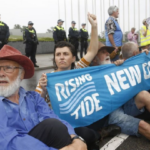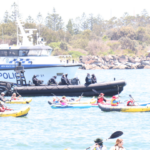Australian Police Top Global List in Terms of Arresting Climate Defenders

A report released in the UK this month confirms what some have long suspected: that in terms of arresting climate defenders, Australian police are some of the most eager on the planet, as, of the broad cross-section of fourteen nations evaluated, the study found ours had arrested the most.
The criminalisation of climate defenders has long been of concern in Australia. However, since a rise in public protests and direct actions in aid of climate commenced right before the 2019/20 Black Summer of bushfires, the crackdown on these types of activists has become all the more severe.
Released earlier this month, the Criminalisation and Repression of Climate and Environmental Protests report was produced by five academics at Bristol University in the UK. And it highlights that the criminalisation and repression of climate defenders is a worldwide phenomenon.
Consulting several global datasets for the period over 2012 to 2023, and along with Australia, the study considered Brazil, France, Germany, India, Norway, Peru, the Philippines, Russia, South Africa, Türkiye, Uganda, the United Kingdom and the United States.
And in making this comparison, the report authors have concluded that state crackdowns on climate defenders are stifling necessary action on climate change, as well as eroding democratic systems, and this is all being facilitated by a plethora of new draconian antiprotest laws.
Global trends in silencing defenders
According to the Bristol University researchers, the apparent spike in the criminalisation of climate protesters is a real occurrence, and concerns about the violation of their rights is too rising, with an outcome being the 2021 appointment of a UN Special Rapporteur on Environmental Defenders.
Four broad mechanisms to ward off climate defenders have been applied by governments across the planet, which include enacting antiprotest laws and prosecuting climate activists, which can involve the depoliticisation of their protest actions so that the threat to climate isn’t mentioned in court.
The overpolicing of climate protests serves to heighten the criminalisation of climate defenders in the public sphere, and in some parts of the Global South, the killing and disappearing of protesters with a focus on climate and the environment plays a prominent role in silencing such dissent.
The report found that over 2,000 climate defenders had been murdered over the study period. Four hundred and one of them had been killed in Brazil, with 298 murdered in the Philippines, 86 killed in India, and 58 people had their lives taken away for raising the climate alarm in Peru.
Researchers further found that, on average, internationally, 3 percent of climate defenders globally face police violence and 6.5 percent of climate protests involve arrests. The report also sets out that 22 pieces of antiprotest legislation had been enacted in these fourteen countries since 2019.
A world leader
The nation of Australia took the cake in terms of the number of arrests being made, as it found that at 20.1 percent of all climate and environmental protests in this country, Australian police take demonstrators into custody for their acts of dissent. This is against a global average of 6.3 percent.
In terms of arrests, Australia was way out in front of all of all other nations, whether they be classed as a “liberal democracy” or an “electoral autocracy”.
The United Kingdom took second place, as it’s undertaken arrests at 17.2 percent of its climate and environmental protests, whilst in Norway, 14.5 percent of these protests involved arrests.
The report also distinguishes between climate and environmental actions, positing that environmental protests take aim at specific projects, such as mining and forestry, while climate rallies have a broader scope, are usually held in urban settings and have “greater political demands”.
In term of the types of protests in Australia, the report found that 12.9 percent of all demonstrations were focused on climate and 3.8 percent were aimed at raising awareness around environmental issues, while police violence was only found to have occurred at 0.5 percent of these events.
In countries like the UK and Australia, climate defence group Extinction Rebellion has played a major role in organising climate demonstrations. In fact, 29 percent of all rallies held in aid of the climate crisis in Australia have been organised by XR.
“If we look to Australia, for example, about 20 percent of all climate protests involve arrests,” researchers explain. “Considering only the climate protests where Extinction Rebellion participated, about 39 percent involve arrests.”
The report further conveys that in countries, like Australia, where climate defence groups, like Extinction Rebellion, operate, there is a direct correlation in a higher number of arrests in respect of such protests.
Other prominent groups in Australia have included Blockade Australia, Fireproof Australia and Disrupt Burrup Hub.
And the Bristol academics concluded that in nations like Australia, the population “enjoys relatively more freedom than other countries”, so “groups that use more radical tactics are more likely to emerge and continue to exist”. And the response from governments is crackdown legislation.
Legislating dissent away
In response to a spike in climate and environmental direct actions by Fireproof Australia and Blockade Australia in early 2022, the Perrottet government passed the NSW antiprotest regime, with bipartisan approval, over March/April that year.
The regime makes it a crime for people to partake in unauthorised protests that block major roads, tunnels or bridges in Greater Sydney, Newcastle and Wollongong, as well as a range of major facilities across the state.
The maximum penalties for these crimes are 2 years in gaol and/or a $22,000 fine.
The University of Bristol report lists the main piece of legislation behind this, the Roads and Crimes Legislation Amendment Act 2022, along with four other bills from various Australian jurisdictions that heralded in similar such laws.
The study lists Queensland’s Summary Offences and Other Legislation Amendment Act 2019, which were the laws that marked the beginning of the national crackdown on climate activists. And this legislation created new offences, broadened police powers and banned lock-on devices.
The bills that facilitated similar draconian penalties as in this state in respect of forestry protests in Victoria and Tasmania that were also passed in 2022 are listed in the report, as is the 2023 South Australian bill that rolled out similar laws as in NSW in that state, but with penalties not as steep.
The UK academics further make the broad recommendation for the criminalisation and repression of climate defenders to stop and for some of these laws to be reversed, as their reasoning is that these crackdowns are hampering necessary action to allay the climate crisis.
The outcome of the steep penalties that are now on the books in NSW was an immediate halt to the widespread demonstrations of that time, as well as a subsequent ending of the prominent place in which the climate crisis had held in the public narrative.
However, despite the NSW Minns government having thrown every measure it could at last month’s Rising Tide blockade of Newcastle Harbour, which is the entrance to the world’s largest coal port, the action was successful in obstructing that waterway for a number of hours on 24 November.
This resulted in, for the first time since NSW enacted the draconian antiprotest penalties, a large number of demonstrators, over 200, willingly taking to the waterway regardless of the risk of arrest and charging under the regime.
And 138 Rising Tide supporters are now willingly facing court in respect of having blocked a major facility and are now facing up to two years inside due to a purposeful act of defiance, which reveals the chilling effect that the draconian regime once possessed is fast dwindling.







